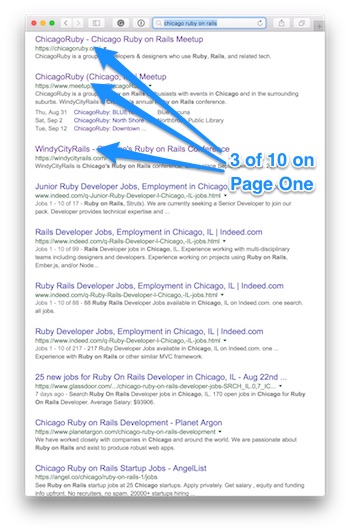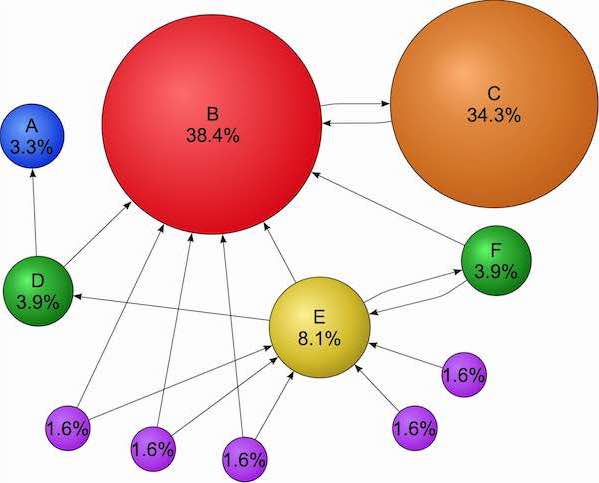Highly Effective SEO
24 Aug 2017
If you’re promoting a site on the web, you may be curious about search engine optimization (SEO). Curiosity about SEO makes sense. If there is a way to raise your ranking in the search engines, why not do it?
This post describes a highly effective way to achieve SEO without resorting to clever schemes.
For Example…
As of the date of this post, Googling the term chicago ruby on rails will generate results similar to the above image. Note that three of the ten results on page one are owned or controlled by the ChicagoRuby Organizer Team. I’ve tried this test on machines in multiple countries, computers that I’ve never touched before (to eliminate the influences of caching and geography). The results are consistent. How did we push ChicagoRuby’s SEO to this level?
How Page Ranking Works
Google looks at two attributes when deciding how high to rank a site in the search results: PageRank and relevance. PageRank measures the importance of a page, determined by the number of pages that link to it (indicated by the arrows in the diagram). Each link is a vote, and important pages cast heavier votes than non-important pages. The process is illustrated in this public domain image from http://en.wikipedia.org/wiki/PageRank.

Relevance (the numbers inside the spheres) measures the value of information contained on the page within the confines of the search term. The major search engines use proprietary algorithms to measure relevance.
Legitimate SEO
There is nothing wrong with communicating your message in the clearest possible way. Legitimate SEO can help you with this. One place to start: Hubspot. The company offers a free online tool called Web Site Grader that measures attributes such as organization, title placement, and page structure to determine the search engine effectiveness of a site.
If you want to improve something, start by measuring it.
Clever Schemes
Clever schemes, like steroids in competitive sports, can produce short term results. But the long-term side effects are painful.
Spamdexing is one example of a clever SEO scheme. Spamdexing is making a site appear to be something other than it is merely so that it can appear higher in the results. One form of spamdexing, keyword stuffing, is the act of repeating a set of keywords throughout the site in an effort to get the site highly indexed for that set of words. The stuffed words may have nothing to do with the actual content of the site. Theyʼre just there to raise the site in the rankings.
Spamdexing is easily discovered and nullified by the major search engines.
Other schemes include:
-
Link Farms – Pages designed only to link to another page in an effort to boost its ranking.
-
Hidden Text – Text that is colored to blend in with the background of a page. Humans canʼt see the text, but search engines can. Modern search engines can also tell when such text is invisible to humans, rendering this tactic ineffective.
The SEO and spamdexing articles at Wikipedia have more information on SEO schemes.
Google, Bing, and Yahoo Are Not Stupid
Why does it make sense to avoid clever schemes? Because Google and the other search engines are not stupid. Clever schemes, when discovered by the search engine crawlers, can actually lower your search ranking. In extreme cases, a search engine may remove the offending site altogether.
How to Increase Your Page Rank
An effective SEO strategy can be summed up as follows:
-
Create a great site with solid, useful content.
-
Give legitimate sites a reason to link to you.
-
Give visitors a reason to come back for more.
-
Track traffic with analytics.
Experience demonstrates that web sites following this strategy move higher in the rankings over time. And they stay on top longer.
Note: An earlier version of this article was posted at WisdomGroup.com.



